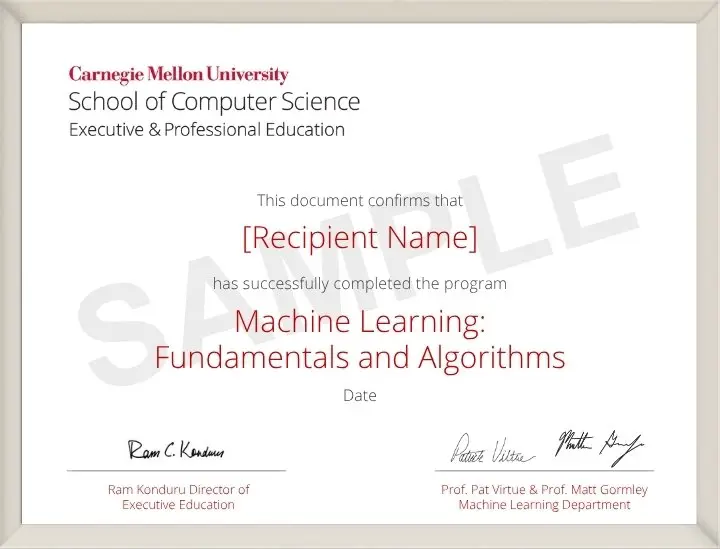
Machine Learning: Fundamentals and Algorithms
Take a self-assessment test to verify your readiness for the math and Python content in this program.
Program Overview: Machine Learning: Fundamentals and Algorithms
The Machine Learning: Fundamentals and Algorithms from Carnegie Mellon University School of Computer Science Executive Education is a 10-week online program designed for technologists, data analysts, engineers, and data managers looking to advance their artificial intelligence (AI) and machine learning skills. With the technology paradigm shifting rapidly toward machine learning and AI, the proficiency of future-ready executives must also shift, expand, and advance. This online program provides you with the technical knowledge and analytical methods that will prepare you for the next generation of innovation.
The program requires a functional knowledge of high-school-level linear algebra, calculus, probability, statistics, and Python programming.
#1 in Artificial Intelligence Specialty and Graduate Programs for Computer Science.
Source: U.S. News & World Report
Key Takeaways
The program enables you to:
Synthesize components of machine learning to create functional tools for the prediction of unseen data
Implement and analyze learning algorithms for classification, regression, and clustering
Use concepts from probability, statistics, linear algebra, calculus, and optimization to describe and refine the inner workings of machine learning algorithms
Who Is the Machine Learning: Fundamentals and Algorithms Program For?
This program is especially ideal for:
Engineers in IT products and services, health care, or banking and financial services who want hands-on instruction in the tools and techniques of machine learning. Representative roles include:
Software engineer
Software developer
Automation engineer
Design engineer
Data analytics professionals in the banking, finance, and IT products and services industries, with responsibility for publishing reports, innovating, and working with analytics in a data-dense environment. This program will be especially relevant for analysts seeking to implement machine learning in projects or to upgrade from spreadsheet-based analysis to more powerful, programmatic data analysis. Representative roles include:
Analyst
Business analyst
Data scientist
Data analyst
Technical managers and directors of data functions leading a team of coders in banking and financial services, IT, health care, retail, logistics, or industrial goods who want to create enterprise value and gain hands-on skills in machine learning technology with the goal of solving business pain points. Representative roles include:
Tech lead
Senior engineer
Senior developer
VP of Engineering
VP of Technology
VP of Analytics
Director of Business Systems & Information Technology
Director of customer experience
Data & integration director
Technology director
Prerequisites: Prior experience with coding is required as participants will be expected to write their own code from scratch. Before enrolling, we strongly encourage you to complete the provided self-assessment exercises to evaluate your competency in mathematics content, Python programming language, and Jupyter notebooks. A passing score indicates your readiness for the rigorous program material, but does not guarantee success. Should you not pass these self-assessments, we recommend you strengthen gaps and weaknesses in your core knowledge and programming skills until you achieve proficiency before program participation.
What You Will Learn in the Machine Learning: Fundamentals and Algorithms Program?
The Machine Learning program curriculum comprises 10 modules to help you broaden and deepen your Python programming skills for machine learning applications. This technical knowledge can be applied across industries, helping organizations integrate machine learning and AI into their digital drivers.
Program Experience

Python Coding Exercise in Each Module

Bite-Sized Learning

Knowledge Checks

Dedicated Program Support Team

Mobile Learning App

Peer Discussion
Meet the Faculty

Assistant Teaching Professor, Computer Science and Machine Learning, Carnegie Mellon University
Pat Virtue’s focus is on teaching techniques for AI, machine learning, and computer science. His interests include active learning teaching methods, effective instruction for ...

Assistant Teaching Professor, Computer Science and Machine Learning, Carnegie Mellon University
At CMU, Matt Gormley regularly teaches the Introduction to Machine Learning program to more than 400 students, one of the largest programs offered by CMU. His research focuses...

Certificate
Upon successful completion of the program, participants will receive a verified digital certificate of completion from Carnegie Mellon University School of Computer Science Executive Education. This is a training program, and it is not eligible for academic credit.
Your digital certificate will be issued in your legal name and emailed to you at no additional cost, upon completion of the program, per the stipulated requirements. All certificate images are for illustrative purposes only and may be subject to change at the discretion of Carnegie Mellon University’s School of Computer Science Executive Education.
Why Carnegie Mellon University School of Computer Science?
At Carnegie Mellon’s Executive Education Program in the School of Computer Science, we provide organizations access to the skills and tools necessary to solve real-world technical problems by equipping the next generation of technology leaders with the experience, insights, and novel solutions developed by our community of computer science experts. From custom training programs to online individualized learning, our cutting-edge programming—backed by faculty who pioneered the field—takes your skill set to the next level, giving you the tools to tackle your organization’s next technological challenge.
FAQs
Didn't find what you were looking for? Write to us at learner.success@emeritus.org or Schedule a call with one of our Program Advisors or call us at +1 315 756 3771 (US) / +44 203 835 5826 (UK) / +65 3138 2533 (SG)
Flexible payment options available.
Starts On
